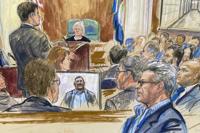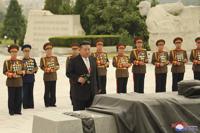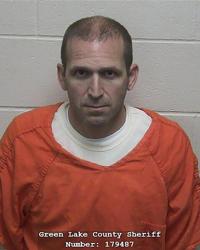ALEXANDRIA, Va. (AP) — A judge declared a mistrial Thursday after a jury said it was deadlocked and could not reach a verdict in the trial of a military contractor accused of contributing to the abuse of detainees at the Abu Ghraib Prison in Iraq two decades ago.
The mistrial came in the jury’s eighth day of deliberations. The deliberations went far longer than the trial itself.
The eight-member civil jury in Alexandria deadlocked on accusations the civilian interrogators who were supplied to the U.S. Army at Abu Ghraib in 2003 and 2004 had conspired with soldiers there to abuse detainees as a means of “softening them up” for questioning.
The trial was the first time a U.S. jury heard claims brought by Abu Ghraib survivors in the 20 years since photos of detainee mistreatment — accompanied by smiling U.S. soldiers inflicting the abuse — shocked the world during the U.S. occupation of Iraq.
Reston, Virginia-based CACI had argued that it wasn’t complicit in the detainees’ abuse. It said that its employees had minimal interaction with the three plaintiffs in the case and that any liability for their mistreatment belonged to the government, not CACI.
Multiple jurors told The Associated Press that a majority of the jury sided with the plaintiffs, but they declined to give an exact numerical breakdown among the eight-member panel.
The jury sent out a note Wednesday afternoon saying it was deadlocked, and indicating in particular that it was hung up on a legal principle known as the “borrowed servants” doctrine.
CACI, as one of its defenses, has argued it shouldn’t be liable for any misdeeds by its employees if they were under the control and direction of the Army.
The plaintiffs’ lawyers tried to bar CACI from making that argument at trial, but Brinkema allowed the jury to consider it.
Both sides argued about the scope of the doctrine. Fundamentally, though, if CACI could prove its interrogators were under the command and control of the Army at the time any misconduct occurred, then the jury was instructed to find in favor of CACI.
The issue of who controlled CACI interrogators occupied a significant portion of the trial. CACI officials testified that they basically turned over supervision of the interrogators to the Army.
Lawyers for the plaintiffs argued otherwise, and introduced evidence including CACI’s contract with the Army, which required CACI to supervise its own employees. Jurors also saw a section of the Army Field Manual that pertains to contractors and states that “only contractors may supervise and give direction to their employees."
In their note explaining their deadlock, the jury said the Field Manual was one of the pieces of evidence over which they disagreed.
The jurors who spoke to AP said there was conflicting evidence in the case about whether CACI retained control of its employees while they were in Abu Ghraib.
The plaintiffs can seek a retrial.
Asked if they would do so, one of their lawyers, Baher Azmy with the Center for Constitutional Rights, said that “the current expectation is that we'll continue to fight.”
”The work we put in to this case is a fraction of what they endured as survivors of the horrors of Abu Ghraib, and we want to honor their courage," Azmy said.
The lawsuit was first filed in 2008 and was delayed by and multiple attempts by CACI to have the case dismissed.
CACI's lawyers declined comment as they left court.
During the , lawyers for the three plaintiffs argued that CACI was liable for their mistreatment even if they couldn’t prove that CACI’s interrogators were the ones who directly inflicted the abuse.
They argued that the interrogators had entered into a conspiracy with the military police who inflicted the abuse by instructing soldiers to “soften up” detainees for questioning.
The evidence included reports from two retired Army generals, who documented the abuse and concluded that multiple CACI interrogators were complicit in the abuse.
Those reports concluded that one of the interrogators, Steven Stefanowicz, lied to investigators about his conduct, and that he likely instructed soldiers to mistreat detainees and used dogs to intimidate detainees during interrogations.
Stefanowicz testified for CACI at trial through a recorded video deposition and denied mistreating detainees.
CACI officials initially had serious doubts about his ability to work as an interrogator, according to evidence introduced at trial. An email sent by CACI official Tom Howard before the company sent interrogators to Iraq described Stefanowicz as a “NO-GO for filling an interrogator position.”
CACI initially sent Stefanowicz over to Iraq not as an interrogator but as a screener, but he testified that the Army — desperately short of interrogators at a prison with a rapidly expanding population — promoted him to interrogator within a day of his arrival.
Trial evidence showed that CACI defended the work of another of its interrogators, Dan Johnson, even after the Army sought his dismissal when photos of the Abu Ghraib abuse became public, and one of the photos showed Johnson questioning a detainee in a crouched position that Army investigators determined to be an unauthorized stress position.








































